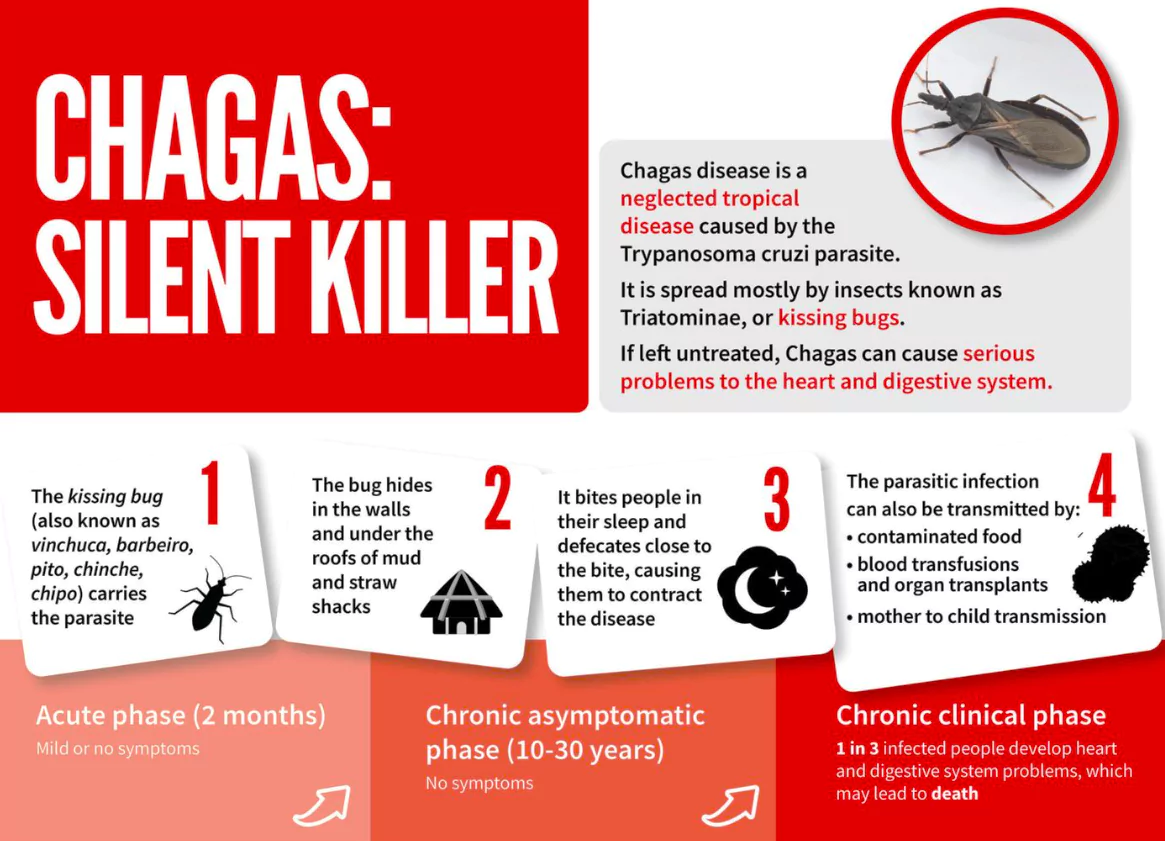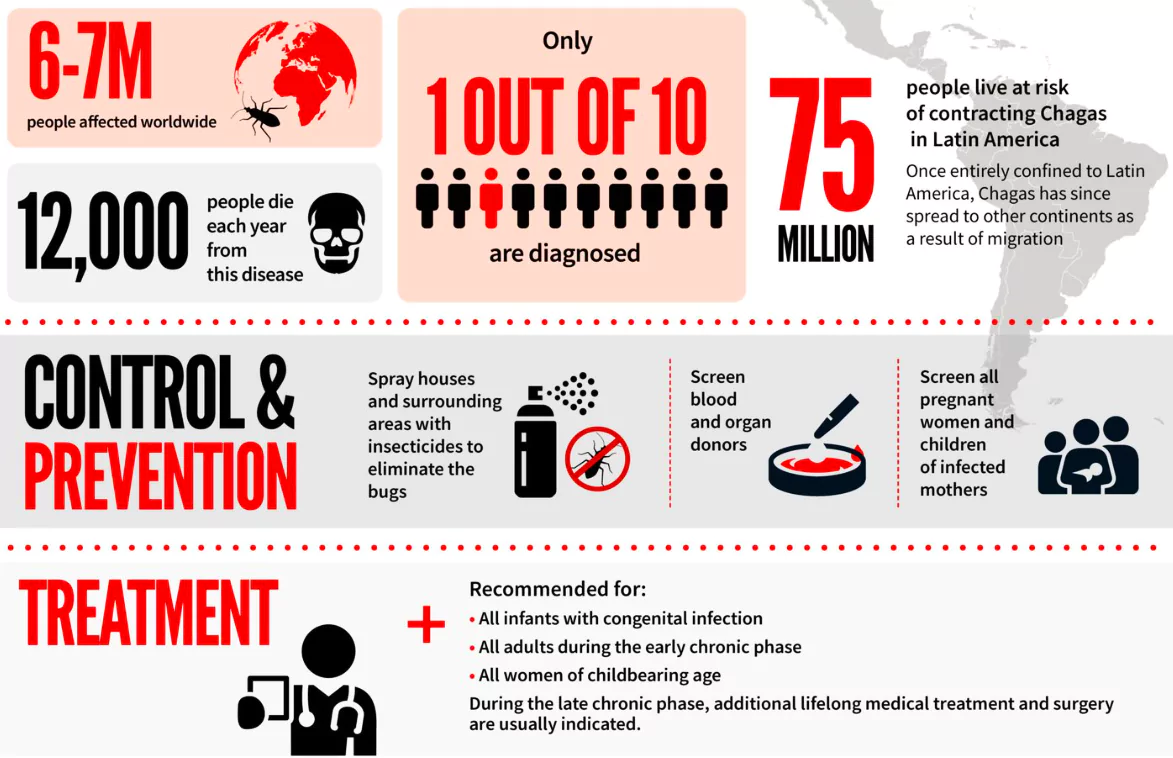Context
April 14 is observed as World Chagas Disease Day, because the first diagnosis of the disease was done by a Brazilian physician, Carlos Chagas on 14 April 1909.
About Chagas Disease
Chagas Disease is also known as American trypanosomiasis, is a potentially life-threatening illness caused by the protozoan parasite Trypanosoma Cruzi.
-
- About 6–7 million people worldwide, mostly in Latin America, are estimated to be infected with Trypanosoma cruzi.
-
Transmission:

-
- It is transmitted to humans through the bite of infected triatomine bugs, also known as “kissing bugs.”
- However, it can also be transmitted through blood transfusions, organ transplantation, congenital transmission from mother to child, and consumption of contaminated food or beverages.
-
Stages of Chagas Disease:
- Disease progresses through two main stages: acute and chronic.
- Acute stage: The acute stage typically occurs shortly after infection and may exhibit mild or no symptoms at all, making it difficult to diagnose.
- Common symptoms include fever, fatigue, body aches, headache, rash, loss of appetite, vomiting, and swelling at the site of infection (chagoma).
- Chronic Stage: If left untreated, the infection progresses to the chronic stage, which can manifest years or even decades after the initial infection
- Chronic Chagas disease can lead to severe complications, including cardiac issues such as cardiomyopathy, arrhythmias, heart failure, and gastrointestinal problems such as megaesophagus and megacolon.
Enroll now for UPSC Online Course
-
Diagnosis of Chagas disease:
- Asymptomatic Chronic Stage: Diagnosing Chagas disease can be challenging due to its often asymptomatic or nonspecific symptoms, especially in the chronic stage.
- Serological Tests: Diagnosis typically involves a combination of serological tests to detect antibodies against T. cruzi and molecular techniques to identify the parasite’s DNA.
- Criticality of Early Diagnosis: Early detection is crucial for preventing the progression of the disease and reducing the risk of complications.
-
Treatment:
- The primary medication used to treat Chagas disease is benznidazole or nifurtimox, both of which are antiparasitic drugs that work by killing the parasite.
- Treatment aims to reduce the parasite’s burden, alleviate symptoms, and prevent the development of complications.
-
Geographical Spread of Disease:
-
- Endemic Regions: Chagas disease is endemic to Latin America, primarily in rural areas of Mexico, Central America, and South America.
- Global Spread: However, due to increased migration and globalization, Chagas disease has become a growing concern in non-endemic regions, including North America, Europe, and the Western Pacific.
Why is the disease referred to as the “silent and silenced disease”?
- Asymptomatic Onset: Chagas disease typically begins with either no symptoms or mild, nonspecific ones, making it easily confused with other common illnesses. Consequently, many individuals do not realize they are infected until serious complications develop much later.
- Limited Recognition and Funding: Historically, Chagas disease has not received as much attention or funding as other infectious diseases, despite its substantial health impact and risk of severe complications.
 Gaps in Healthcare Provision: The insufficient awareness and funding have resulted in significant gaps in surveillance, diagnosis, and treatment, especially in areas where the disease is endemic and healthcare access is constrained.
Gaps in Healthcare Provision: The insufficient awareness and funding have resulted in significant gaps in surveillance, diagnosis, and treatment, especially in areas where the disease is endemic and healthcare access is constrained.
Prevention and Control:
- Vector Control Measures: Preventing Chagas disease primarily involves vector control measures to reduce the risk of triatomine bug bites and interrupt transmission.
- This includes improving housing conditions to minimize insect infestations, using insecticide-treated bed nets, and implementing community-based vector surveillance and control programs.
- Other Preventive Measures: Includes screening blood donors and implementing measures to reduce the risk of vertical transmission from mother to child.
Also Read: India Cancer Capital Of The World

 Gaps in Healthcare Provision: The insufficient awareness and funding have resulted in significant gaps in surveillance, diagnosis, and treatment, especially in areas where the disease is endemic and healthcare access is constrained.
Gaps in Healthcare Provision: The insufficient awareness and funding have resulted in significant gaps in surveillance, diagnosis, and treatment, especially in areas where the disease is endemic and healthcare access is constrained.